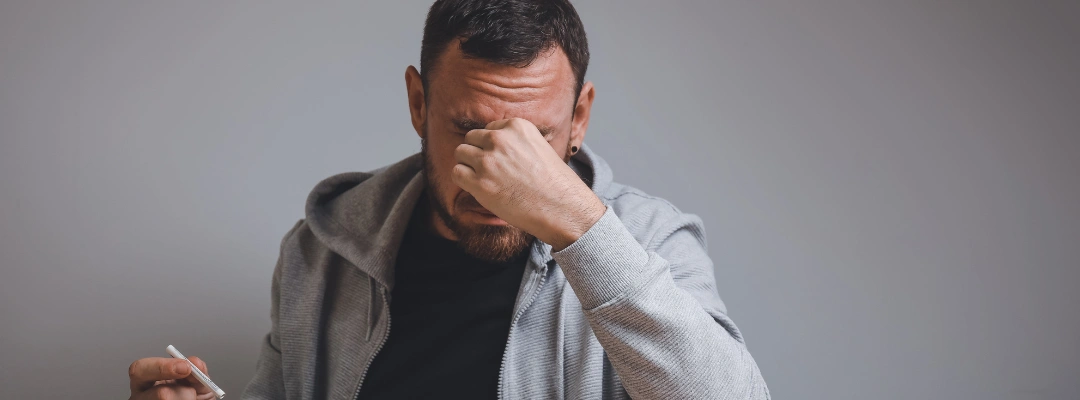How to Detox from Cocaine Safely
What You Need to Know About Cocaine Detox and Getting Support
Nobody sets out to become dependent on cocaine. Maybe it starts out social, just something you did on the weekends. You probably never imagined you’d reach the point where stopping feels terrifying.
But if you’re here, reading this, it means you’re already thinking about change. And that’s where hope begins.
Cocaine has a way of creeping in slowly. It promises energy, confidence, and escape. But then it takes.
It strips you of rest, peace, and control (not to mention the financial cost). And when the high wears off, the crash leaves you drained, depressed, and desperate for more. Trying to quit on your own might have felt impossible at times.
The symptoms aren’t just uncomfortable. They can be downright brutal, especially from a psychological standpoint. But here’s what you need to hear most: you don’t have to do this alone, and there is a safe way forward.
At South Shores Recovery, we specialize in helping people just like you begin the healing process. Our clinical team is trained to guide you through every phase of the detox process, with compassion and expert care.
When you’re ready to stop using cocaine safely, we’re here to make sure you never have to risk your health or your life in doing so.
What Cocaine Detox Actually Feels Like
If you’ve tried to stop using cocaine before, you already know the withdrawal symptoms can feel overwhelming. It’s not just about cravings. The fatigue, the emotional collapse, the mental fog. These are signs your brain is trying to adjust to life without stimulation. And that adjustment process is often messy and exhausting.
Cocaine withdrawal is largely psychological. You might find yourself battling severe depression, irritability, anxiety, and suicidal thoughts. You could lose your appetite entirely, or you may swing the other way and experience an increased appetite. Sleep becomes unpredictable.
Some people sleep too much; others can’t sleep at all. Nightmares and mental agitation are common. The psychological symptoms hit hard, and for many, it’s these internal shifts that lead right back to using.
At South Shores Recovery, we never minimize your experience. Your symptoms are real. Your struggle is valid. And your recovery is possible.
What to Expect During the Cocaine Withdrawal Timeline
The timeline of cocaine withdrawal will vary depending on how long you’ve used, how much, and how often. For some, symptoms peak within a few days. For others, it can take several weeks to feel stable again. Typically, you’ll experience a three-phase progression during detox from cocaine.
The first stage is the crash. This is the sudden loss of energy, motivation, and focus that sets in within 24 hours of stopping. You’ll feel flat, lethargic, and possibly emotionally unstable. This phase usually passes within a few days.
Next comes the acute withdrawal stage. This is when intense cravings, mood swings, and mental health struggles surface. You may feel anxious, paranoid, or hopeless. Physical symptoms like muscle aches, chills, or tremors may appear, though they tend to be less severe than in opioid or alcohol detox.
After that comes the post-acute withdrawal phase, which can last for weeks or months. This is where protracted withdrawal symptoms like low motivation, poor concentration, and sleep disturbances linger. During this time, you’ll need consistency, support, and a focus on your mental health.
South Shores Recovery offers continuous care through each stage. From the first night to your long-term stabilization, our team is by your side.
The Dangers of Detoxing from Cocaine at Home
It might seem tempting to detox at home. Maybe you’ve told yourself that cocaine is “just mental” and not physically addictive. But cocaine detox isn’t something to take lightly. The risk of relapse is dangerously high during the first few days. And every relapse increases your chances of a cocaine overdose.
Trying to white-knuckle through the withdrawal symptoms without professional support can leave you vulnerable. Your mind may turn against you.
Panic attacks, paranoia, and suicidal ideation are common in unsupervised detox situations. Even if you’ve gone through withdrawal before, it doesn’t make the next time safer.
That’s why South Shores Recovery offers medically supervised detox. Safety, support, and structure matter. You deserve to feel secure while you heal.
A Typical Medically Supervised Cocaine Detox
In our medical detox programs, every client receives a personalized plan tailored to their history and needs. We begin with a full evaluation of your cocaine use, mental and physical health, and any co-occurring conditions.
Our team of medical professionals monitors you throughout the process. We’re here to manage withdrawal symptoms, stabilize your mood, and help reduce intense cravings. If you’re experiencing emotional distress, we integrate mental health treatment and counseling early.
The detoxification process is approached with care, precision, and empathy. We follow the best clinical practices backed by institutions like the National Institute on Drug Abuse, the Substance Abuse and Mental Health Services Administration, and World Health Organization. Your safety comes first, always.
The Role of Cravings and Psychological Support
The craving for cocaine can feel like an obsession. It hijacks your thoughts, your body, and your will. You may feel like nothing matters more than getting high again, just to quiet your mind. These drug cravings are among the hardest parts of withdrawal.
At South Shores Recovery, we address cravings head-on. Through both behavioral therapies and targeted medication where appropriate, we help reduce the power cocaine holds over your thinking.
One study on the SAMHSA website explains that it is common to see “emotional regulation issues and problems with impulse control in newly abstinent individuals dependent on cocaine.” It is for this reason that you’ll work closely with addiction specialists who understand how the brain responds to stimulus and reward. We will help you understand how to rewire it for long-term recovery.
This is also where support groups, emotional support, and therapy become essential. The isolation of withdrawal can fuel relapse. Being connected to others is what makes healing possible.
The Hidden Impact of Cocaine Abuse and Addiction
What makes cocaine addiction especially difficult to overcome is how deceptive it is. The drug doesn’t leave visible marks like some others do, but it rewires your mind in a way that’s deeply personal. According to this government resource website, “the craving and depression can last for months after stopping long-term heavy use.”
You might not see it right away, but your behavior changes, your priorities shift, and your relationships start to fray. Cocaine use hijacks your reward system. And by the time you realize you’re in trouble, the hooks are already deep.
Why Cocaine Withdrawal Symptoms Are Harder Than Most People Expect
Cocaine withdrawal doesn’t just strike when you stop using. It can creep in hours after your last dose. The crash is jarring, and many people experience emotional numbness, confusion, or extreme fatigue.
If you’ve been through this before, you know how hard it is to manage withdrawal symptoms on your own. The cravings hit when you’re at your weakest.
That’s why detox from cocaine isn’t about willpower. It is about support and structure. Without the right environment, even the strongest intentions can collapse.
At South Shores Recovery, we’ve helped hundreds of clients move through cocaine withdrawal symptoms with dignity. We know how to ease the process and protect your well-being while you navigate the intensity of cocaine withdrawal symptoms.
These symptoms can include everything from disrupted sleep patterns and restlessness to intense psychological symptoms like depression or anxiety. Left unmanaged, they can derail your recovery before it’s even begun.
Repairing Sleep Patterns and Stabilizing the Mind
The early days of cocaine withdrawal symptoms often bring a wave of exhaustion. According to this study from the National Institute of Health, your sleep patterns will be completely broken. You man be unable to sleep at all or you crash for long hours without feeling rested. This is your brain’s response to the absence of stimulation.
Over time, with support, these patterns begin to stabilize. But trying to fix them alone often leads right back into drug abuse. This is why medical professionals are so necessary.
A More Complete Approach to Cocaine Addiction Treatment
Cocaine addiction treatment at South Shores Recovery focuses on the whole person. It’s not enough to simply survive detox. We help you understand why the cycle of substance abuse took hold in the first place.
By integrating therapy, mental health support, and relapse prevention tools, we make sure your recovery doesn’t stop at stabilization. We also recognize that many people struggling with cocaine use are dealing with co-occurring substance use disorders.
If you’ve used other substances to cope or to soften the comedown, we’ll help you address that too.
Safe cocaine detox is your first real step toward freedom from cocaine addictions. And you don’t have to do it alone. Cocaine addiction treatment is only a call away.
What Happens After Cocaine Detox at the Shores?
Detox from cocaine is the beginning, not the solution to cocaine addiction in itself. Once the withdrawal process is complete, it’s time to explore what drove the addiction in the first place. That’s when you start digging into the underlying issues.
At South Shores Recovery, we build a comprehensive treatment program based on your needs. For some, that means inpatient care. For others, outpatient support with therapy and continued mental health care makes more sense. No matter your path, we stay with you through the entire recovery process.
We also offer resources for coping skills, relapse prevention, and long-term planning. Whether it’s managing triggers, healing relationships, or rebuilding your self-worth, we help you move forward.
Why Detox Is Safer With Professional Help
The truth is, proper medical supervision during detox makes a massive difference. You’re not just enduring the symptoms. You’re supported, seen, and stabilized. Our clinical team keeps a close eye on your physical response, especially if you’ve experienced chronic cocaine use or severe addiction.
Detoxing “cold turkey” sounds brave but is often unsafe. Your body’s response to withdrawal can vary every time. That’s why we personalize each step of care. We also help you recognize other complications like co-occurring disorders. Observing when mental health and substance use disorders combine, so nothing is missed in your healing journey.
This isn’t just about surviving detox. It’s about preparing for a lasting recovery.
Cocaine Detox and the Need for Dual Diagnosis Support
For many clients, cocaine addiction isn’t the only issue. It often occurs alongside anxiety, depression, trauma, or other mental health diagnoses. That’s why we approach detox with a dual-diagnosis lens.
Whether you’re struggling with bipolar disorder, PTSD, or alcohol addiction alongside cocaine use, we offer integrated support.
Our clinicians understand that substance abuse rarely exists in isolation. Real recovery means addressing the full picture. We don’t treat symptoms in isolation. We treat the whole person.
Start Detoxing from Cocaine Safely at South Shores Today
If you’re ready to quit cocaine, do it the right way. Don’t risk going it alone. Don’t gamble with your life or your future. Choose a path that’s safe, proven, and supportive to overcome cocaine addiction or abuse.
Contact South Shores Recovery now to begin medically guided cocaine detox in safety and with a proven, compassionate team to support success in getting clean.
Medical Reviewer
Katrina Harris
LMFT, Clinical Visionary Officer
Read Bio
Author
Christina Tchamanian
Program Director
Read Bio
Contact us






